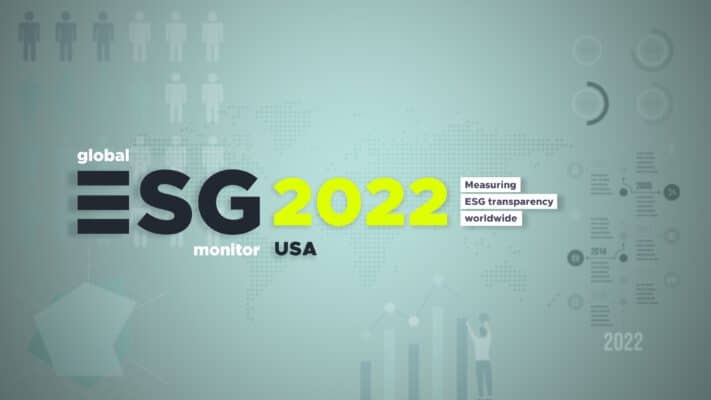IS OUT NOW

ESG Reporting Tsunami Threatens U.S. Companies
Tech titans and Major Corporations at Bottom of New Global Study
Washington, DC (April 20, 2023) – Amid pending action by the Securities and Exchange Commission (SEC) to implement sustainability disclosure requirements for publicly traded companies, a groundbreaking report from the Global ESG Monitor (GEM) finds ESG transparency among American corporations lagging those in Europe.
Five of the largest companies in the world are tech titans Alphabet (Google), Amazon, Apple, Meta and Microsoft, with all achieving low ratings. Google’s performance was especially dismal, falling in the bottom 10% of companies scored globally.
“The Global ESG Monitor found U.S. corporations continuing to significantly trail global counterparts at transparently disclosing their sustainability and ESG practices,” said Ariane Hofstetter, Cofounder and Chief Data Scientist of the Global ESG Monitor. “According to our analysis, there continues to be critical flaws in the disclosure of ESG data – particularly among the technology companies with massive influence on American society. The United States remains in an inferior position when it comes to ESG reporting and more disclosure requirements are needed.”
A unique analysis examining non-financial ESG reporting transparency, the GEM is an annual report analyzing leading stock indexes worldwide. The survey grew to 350 companies worldwide from 140 companies in 2021, to include 60 Dow Jones and S&P 50 companies scored in the United States.
U.S. companies significantly trailed in climate reporting transparency, with just 60% of S&P 50 companies highlighting emissions sources and 73% disclosing emissions goals – compared to 90% or higher in both categories for the EUROSTOXX exchange. Specific sources of emissions are similarly underreported, with less than half of U.S. companies identifying their Scope 3 supply chain, which accounts for an average of 75% of a company’s emissions according to the World Resources Institute.
Tech giants Alphabet, Meta, and Microsoft ranked near the bottom of the companies scored worldwide, which included sustainability disclosures as well as social and governance transparency. Abbott Laboratories was the lone U.S. company to achieve a “very high transparency” designation, while Bristol-Meyers Squibb received the lowest score of any U.S. company.
The SEC is currently in the processing of finalizing The Enhancement and Standardization of Climate-Related Disclosures for Investors, which would require publicly traded companies to report on sustainability data. While evolving, the rule includes Scope 1 and 2 carbon emissions, and Scope 3 indicators that meet certain materiality criteria.
A lack of quality ESG reporting in the U.S. can be partially attributed to a lack of comprehensive regulations. If implemented, the SEC’s proposed rulemaking will provide investors with more reliable data regarding corporate sustainability practices.
“Without the disclosure of quality data, company sustainability efforts are all hat and no cattle,” said David Fuscus, President of Xenophon Strategies, the US regional partner for the GEM. “Unfortunately, the lack of a uniform framework for ESG reporting in the U.S. incentivizes a lack of reporting on the issues most important to stakeholders. The results of the Global ESG Monitor are just the ammunition the SEC needs to finalize their critical climate disclosure rulemaking.”
Contacts:
Media Contact: Matt Smith
Mattsmith@xenophonstrategies.com
